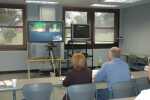Developing communities from across the globe

Wednesday morning a group of Iraqis and a group of Vernon Countians got together face to face and discussed ways to improve the Iraqi economy in Babil province. The Iraqis met at the South Central Regional Provincial Reconstruction Team headquarters in the Regional Embassy Office in Al Hillah, Iraq, and the Vernon Countians met at the Nevada Regional Technical Center. A representative of the University of Missouri at Columbia was present as well. They were brought face to face through video teleconferencing that allowed real-time discussions despite being thousands of miles apart.
The military has had such a system in operation in Iraq for some time, and the Embassy has used it to communicate with the State Department and the White House. However this is entirely a civilian effort. Co-organizer Leslie Carroll-Bartlett was key in getting the video teleconference set up.
"This is grass roots participating in helping and that's very innovative," Bartlett said. "I'm excited to be a part of it and I'm sure it will be very educational."
Co-organizer Sam Foursha, speaking from Iraq, started off the meeting with a famous line from a Robin Williams movie.
"Good Morning America," Foursha said, stretching out the words as Williams did in the movie. "Speaking on behalf of the South Central Regional PRT, we're meeting at the Regional Embassy office in Hillah."
Along with Foursha were several members of the Provisional Reconstruction Team and several Iraqis who represented various segments of the population including the Hillah Chamber of Commerce and an extensions specialist whose job is similar to ones at county extension offices throughout Missouri.
On the Vernon County side, Bartlett worked as a facilitator and moderator to help keep the discussion on track. Attending were Vernon County Extension Agent Wayne Prewitt; Nevada/Vernon County Chamber of Commerce Director Kathi Wysong; NRTC Director Jim Chandler; Telecenter Coordinator Janice Collins; Jane Westerhold; Foursha's wife, Cindy, and Betty Jean Gobin, whose grandson is in Iraq.
A lone participant represented Columbia, Rachel Mutrux, director of the Missouri Telehealth Network at the University of Missouri School of Medicine.
"There are many ways a video teleconference can help," Mutrux said. "Continuing education for medical personnel can be held and clinics for patients can bring patients and specialists together."
Mutrux said patients were often more comfortable with the technology than the doctors were.
"We find that patients are very willing to be treated this way, the problem is often to get the physicians to adopt the technology," Mutrux said.
Mutrux answered a question from the Iraq side of the conference about taping continuing education sessions.
"By U.S. law continuing education has to be interactive," Mutrux said. "We tape the sessions to DVD and someone could certainly review it in order to better understand it."
Bartlett showed how NRTC could help with distance treatment for patients and demonstrated how a close-up of a hand could be done.
"I don't have the high-definition camera here but I can show you with this document camera how that can work," Bartlett said as she held her hand under the camera and zoomed in on it. "It can really zoom in and show warts and all. Too many warts really."
During the discussion there were pauses while translations were done for those whose English wasn't good enough to follow the discussion. Prewitt led off the conference and explained the purpose of the county extension service in Missouri and some of the programs offered through it. Wysong explained how the chamber worked as a partner to business in promoting the business and helping to attract other businesses that enhanced the business environment in the area.
The Iraqi counterpart to Prewitt said that there were several problems with agriculture in Babil Province starting with an inadequate irrigation system and outdated equipment, problems inherited from the years of Saddam Hussein's rule. Security remains a problem making it difficult, if not impossible, to transport produce to markets where demand is high.
"We need new technology to replace the old worn out equipment and new produce to meet demand," the Iraqi agriculture specialist said.
A member of the Hillah Chamber of Commerce said that there were 250 members in the local chamber. He said the chamber provided a number of services to local members.
"We provide some loans, teach computer use and in some circumstances we provide legal services," the chamber member said. "We have trade shows all around Iraq and some members have gone to trade shows in the United Arab Emirates. We even provide credit card services to our members."
Foursha brought the teleconference to a close and said that another teleconference would be held in a few weeks and encouraged participation. He said it was one way to get the needed expertise in front of the people who need it without going to the expense of traveling to Iraq.
"It's difficult to get someone into Iraq," Foursha said. "The red tape involved is extensive and security once they get here is a problem. Teleconferences help bring people together without the red tape and security issues."
Once the conference drew to a close most of the people left the room to give Foursha and his wife time alone, even if they were separated by thousands of miles.
